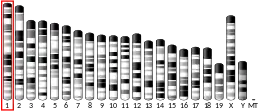RFWD2
E3 ubiquitin-protein ligase RFWD2 is an enzyme that in humans is encoded by the RFWD2 gene.[5][6]
| COP1 | |||||||||||||||||||||||||||||||||||||||||||||||||||
|---|---|---|---|---|---|---|---|---|---|---|---|---|---|---|---|---|---|---|---|---|---|---|---|---|---|---|---|---|---|---|---|---|---|---|---|---|---|---|---|---|---|---|---|---|---|---|---|---|---|---|---|
| |||||||||||||||||||||||||||||||||||||||||||||||||||
| Identifiers | |||||||||||||||||||||||||||||||||||||||||||||||||||
| Aliases | COP1, RNF200, ring finger and WD repeat domain 2, E3 ubiquitin ligase, RFWD2, COP1 E3 ubiquitin ligase, FAP78, CFAP78 | ||||||||||||||||||||||||||||||||||||||||||||||||||
| External IDs | OMIM: 608067 MGI: 1347046 HomoloGene: 115565 GeneCards: COP1 | ||||||||||||||||||||||||||||||||||||||||||||||||||
| |||||||||||||||||||||||||||||||||||||||||||||||||||
| |||||||||||||||||||||||||||||||||||||||||||||||||||
| |||||||||||||||||||||||||||||||||||||||||||||||||||
| |||||||||||||||||||||||||||||||||||||||||||||||||||
| |||||||||||||||||||||||||||||||||||||||||||||||||||
| Wikidata | |||||||||||||||||||||||||||||||||||||||||||||||||||
| |||||||||||||||||||||||||||||||||||||||||||||||||||
References
- GRCh38: Ensembl release 89: ENSG00000143207 - Ensembl, May 2017
- GRCm38: Ensembl release 89: ENSMUSG00000040782 - Ensembl, May 2017
- "Human PubMed Reference:". National Center for Biotechnology Information, U.S. National Library of Medicine.
- "Mouse PubMed Reference:". National Center for Biotechnology Information, U.S. National Library of Medicine.
- Wang H, Kang D, Deng XW, Wei N (Sep 1999). "Evidence for functional conservation of a mammalian homologue of the light-responsive plant protein COP1". Curr Biol. 9 (13): 711–4. doi:10.1016/S0960-9822(99)80314-5. PMID 10395541. S2CID 2822539.
- "Entrez Gene: RFWD2 ring finger and WD repeat domain 2".
- Wertz IE, O'Rourke KM, Zhang Z, Dornan D, Arnott D, Deshaies RJ, Dixit VM (Feb 2004). "Human De-etiolated-1 regulates c-Jun by assembling a CUL4A ubiquitin ligase" (PDF). Science. 303 (5662): 1371–4. Bibcode:2004Sci...303.1371W. doi:10.1126/science.1093549. PMID 14739464. S2CID 40501515.
- Bianchi E, Denti S, Catena R, Rossetti G, Polo S, Gasparian S, Putignano S, Rogge L, Pardi R (May 2003). "Characterization of human constitutive photomorphogenesis protein 1, a RING finger ubiquitin ligase that interacts with Jun transcription factors and modulates their transcriptional activity". J. Biol. Chem. 278 (22): 19682–90. doi:10.1074/jbc.M212681200. hdl:2434/518351. PMID 12615916.
Further reading
- Hoecker U, Quail PH (2001). "The phytochrome A-specific signaling intermediate SPA1 interacts directly with COP1, a constitutive repressor of light signaling in Arabidopsis". J. Biol. Chem. 276 (41): 38173–8. doi:10.1074/jbc.M103140200. PMID 11461903.
- Yi C, Wang H, Wei N, Deng XW (2003). "An initial biochemical and cell biological characterization of the mammalian homologue of a central plant developmental switch, COP1". BMC Cell Biol. 3: 30. doi:10.1186/1471-2121-3-30. PMC 138799. PMID 12466024.
- Bianchi E, Denti S, Catena R, Rossetti G, Polo S, Gasparian S, Putignano S, Rogge L, Pardi R (2003). "Characterization of human constitutive photomorphogenesis protein 1, a RING finger ubiquitin ligase that interacts with Jun transcription factors and modulates their transcriptional activity". J. Biol. Chem. 278 (22): 19682–90. doi:10.1074/jbc.M212681200. hdl:2434/518351. PMID 12615916.
- Wertz IE, O'Rourke KM, Zhang Z, Dornan D, Arnott D, Deshaies RJ, Dixit VM (2004). "Human De-etiolated-1 regulates c-Jun by assembling a CUL4A ubiquitin ligase" (PDF). Science. 303 (5662): 1371–4. Bibcode:2004Sci...303.1371W. doi:10.1126/science.1093549. PMID 14739464. S2CID 40501515.
- Dornan D, Wertz I, Shimizu H, Arnott D, Frantz GD, Dowd P, O'Rourke K, Koeppen H, Dixit VM (2004). "The ubiquitin ligase COP1 is a critical negative regulator of p53". Nature. 429 (6987): 86–92. Bibcode:2004Natur.429...86D. doi:10.1038/nature02514. PMID 15103385. S2CID 4319187.
- Dornan D, Bheddah S, Newton K, Ince W, Frantz GD, Dowd P, Koeppen H, Dixit VM, French DM (2004). "COP1, the negative regulator of p53, is overexpressed in breast and ovarian adenocarcinomas". Cancer Res. 64 (20): 7226–30. doi:10.1158/0008-5472.CAN-04-2601. PMID 15492238.
- Dornan D, Shimizu H, Mah A, Dudhela T, Eby M, O'rourke K, Seshagiri S, Dixit VM (2006). "ATM engages autodegradation of the E3 ubiquitin ligase COP1 after DNA damage". Science. 313 (5790): 1122–6. Bibcode:2006Sci...313.1122D. doi:10.1126/science.1127335. PMID 16931761. S2CID 34368821.
This article is issued from Wikipedia. The text is licensed under Creative Commons - Attribution - Sharealike. Additional terms may apply for the media files.



